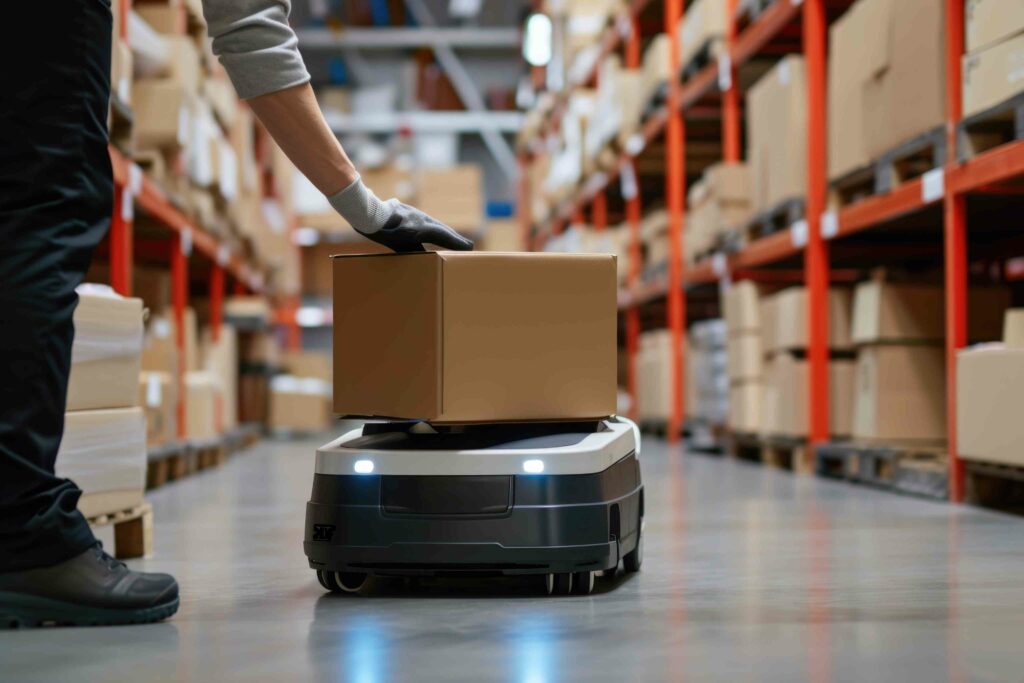Welcome to a fascinating exploration of how artificial intelligence (AI) is revolutionizing the eCommerce landscape this 2024. AI integration in eCommerce isn’t just about technology; it’s about crafting personalized shopping adventures, enhancing operational efficiencies, and setting new benchmarks in customer satisfaction.
This week, we’ve seen industry giants like Amazon, Google, and Walmart lead with groundbreaking AI applications that are not merely enhancing the shopping experience but transforming it into something dynamic and intuitive. These developments give us a peek into a future where your shopping cart knows what you need before you do, and virtual aisles adapt to your preferences in real-time.
As eCommerce marketers, owners, and managers, understanding these AI-driven innovations is crucial not only for staying competitive but for pioneering in an industry that stands on the brink of a new digital era. From predictive analytics improving stock management to AI chatbots revolutionizing customer service, the possibilities are limitless.
So, let’s delve deeper into this transformative journey, examining how AI is influencing various aspects of eCommerce, from backend operations to front-end consumer interactions and setting the stage for what might just be the most exciting phase of digital commerce yet.
The Pioneers of AI in eCommerce
As we look at the application of AI in big-name companies this week, it’s clear that the push towards a more automated and insightful online shopping experience is stronger than ever. Innovations pioneered by sector leaders are not just setting trends but are also offering key insights into how smaller players can leverage AI to make their mark.
Stay tuned as we unpack more updates and explore these innovative integrations in-depth. The age of AI in eCommerce is just beginning, and it promises to redefine how businesses operate and how consumers shop in the digital space.
Unveiling the AI Revolution in eCommerce
Welcome to an exciting exploration of how artificial intelligence (AI) is transforming the eCommerce landscape. Today’s online shopping experience is rapidly evolving beyond simple transactions. With the integration of AI, it’s becoming a highly personalized and interactive journey. Imagine shopping for a new backpack and having an AI chatbot not only assist you but also offer recommendations tailored to your preferences and past purchases. This is not a distant dream; it’s today’s reality in eCommerce.
Amazon: Pioneering AI to Enhance Convenience
Let’s delve into Amazon’s recent strategic moves. Under the new leadership of Matt Garman, Amazon’s cloud division is placing a renewed emphasis on AI capabilities. Why the focus on AI? In the cutthroat realm of online retail, staying ahead often means being the earliest adopter of breakthrough technologies. For Amazon, this focuses on making shopping ultra-efficient through smarter AI-enhanced services like Alexa. Imagine Alexa not just managing your shopping list but also predicting your household needs and automating reorders of your favorite products, transforming how you manage your home’s supplies.
Salesforce and AI Copilots: Transforming Data into Insights
At Salesforce’s Connections 2024, exciting announcements outlined the future of business management with AI. Salesforce introduced AI-enabled copilots designed to revolutionize how businesses interact with data. These tools don’t just automate mundane tasks; they provide crucial insights into consumer behavior, helping eCommerce businesses fine-tune their strategies and focus more on product quality and customer satisfaction.
Google’s Smart Search: AI Enhances Discoverability
Google is not one to be left behind in the AI race, enhancing its product search and advertising using advanced AI techniques. The tech giant is working towards search algorithms that are capable of understanding the intent behind your queries, ensuring that your search results are more relevant and personalized than ever. The impact on the online shopping experience is profound, making product discovery smoother and more intuitive.
Walmart’s Leap into the Metaverse and Beyond
Walmart is also embracing innovative AI solutions, expanding into the metaverse and enhancing their influencer collaborations through Walmart Realms. By creating a virtual shopping environment, Walmart is not just altering how we shop; they are setting a new standard for engaging the digital-native generation, merging the excitement of gaming with the convenience of online shopping.
The Bright Future of AI in eCommerce
Every stakeholder in the eCommerce ecosystem is striving to introduce more appealing, efficient, and personalized shopping experiences through AI. These developments highlight a trend where shopping becomes less of a chore and more of a delightful, seamlessly integrated aspect of everyday life. As AI continues to evolve, the potential for even more personalized and convenient shopping experiences grows, marking an exhilarous phase for both consumers and businesses in eCommerce.
As we embrace the fascinating advancements in AI, the intersection of digital innovation and personalization is becoming increasingly nuanced, promising a future where our shopping experiences are catered specifically to our needs and preferences. The journey of AI integration into eCommerce is just beginning, and it’s already redefining the boundaries of what’s possible in online shopping.
AI Integration in eCommerce 2024: Lessons from Legacy Brands and Market Leaders
Welcome back to our exploration of the dynamic world of retail strategy and current market trends—a topic that’s continually shifting and consistently engaging. In today’s discussion, we traverse through a compelling mix of narratives from stalwart names in the industry—John Deere, Red Lobster, and Peloton, alongside an insightful look at how Walmart is tuning its strategy to attract a more diverse clientele in 2024.

John Deere: Mastering Content Marketing Since 1895
Let’s start with a name synonymous with farming—John Deere. But today, we’re not discussing tractors; instead, we delve into John Deere’s pioneering content marketing strategy with ‘The Furrow’. Launched in 1895, this magazine isn’t just about farming equipment but is a masterclass in branding and customer engagement. The longevity of ‘The Furrow’ teaches us the enduring power of providing valuable, practical content. Imagine the impact of integrating such a strategy with modern AI tools to analyze customer behavior and personalize content in your digital storefront. John Deere’s enduring success strongly suggests the potential gains from such an approach.
Red Lobessor’s Private Equity Transformation
Transitioning to the culinary seas, Red Lobster presents a different tale post its private equity acquisition. A deep dive into Red Lobster’s business strategy post-acquisition reveals the delicate balance between financial efficiency and operational integrity. Private equity often aims to streamline processes and boost profitability but can sometimes lead to tough decisions affecting staff morale and customer satisfaction. This scenario serves as a critical lesson for eCommerce platforms; balancing automation and personalized interactions can make or break the customer experience.
Peloton: Navigating Financial Obstacles with Strategic Foresight
Peloton, once a market leader in the home fitness industry, faced significant challenges as its shares plunged due to financial restructuring plans. By analyzing Peloton’s approach to its financial woes, eCommerce businesses can glean insights into managing investor confidence and maintaining stability through strategic financial planning. Integrating advanced predictive AI to manage inventory and customer retention could be key strategies to emulate in similar situations.
Walmart: Catering to Evolving Consumer Preferences
Lastly, Walmart’s strategy to attract higher-income customers seeking affordable, healthier options marks a significant shift. A look into how Walmart is adapting its offerings to meet changing consumer trends highlights the importance of adaptability in retail. Applying AI to analyze emerging trends and adjusting offerings accordingly could greatly boost an eCommerce platform’s relevance and appeal across various demographics.
Whether it’s leveraging content for customer loyalty, balancing investments with operational needs, navigating financial restructuring, or adapting to consumer health trends, these stories underscore the importance of flexibility and foresight in the retail sector. How you apply these lessons could significantly influence your success in the rapidly evolving market of 2024.
Stay tuned for more insights into how traditional strategies evolve and new ones emerge, keeping the fascinating world of retail vibrant and dynamic. Keep exploring beyond the storefront!
The Evolution of Supply Chains: Embracing AI Integration in 2024
Imagine a world where the logistics of getting your favorite products are invisibly smooth — a world where goods navigate through complexities like labor negotiations and environmental challenges seamlessly. The AI integration in eCommerce for 2024 is set to revolutionize how we think about supply chain management and operational resilience. This vision is not just aspirational. It’s becoming a tangible reality as companies leverage technology and innovate to stay ahead in the global market.

The Backbone of Resilience: East Coast’s Proactive Moves
At the heart of supply chain evolution are proactive strategies, such as those unfolding at the bustling East Coast ports. With ongoing labor negotiations threatening to disrupt operations, companies are not merely on standby. Instead, they are actively developing contingency plans, illustrating a shift towards adaptive, A.I.-driven predictive analytics that forecast and mitigate risks before they escalate.
Innovation on the Docks: Port of Long Beach’s Green Leap
Meanwhile, across the coast at the Port of Long Beach, a groundbreaking initiative by Forum Mobility is setting the stage for sustainable logistics. Their construction of new charging stations for electric trucks epitomizes the dual aims of environmental stewardship and cutting-edge logistics. As AI integrates deeper into supply chain operations by 2024, such initiatives will become crucial in aiding realtime, automated decision-making that balances cost, speed, and environmental impact.
Strengthening Ties: UNFI and Whole Foods’s Strategic Extension
The recent decision by UNFI to extend their distribution deal with Whole Foods until 2032 is another testament to the power of strategic foresight and strong partnerships, anchored by AI’s predictive power. Read more about this deal here. This alliance harnesses data analytics to streamline operations, optimize inventory levels, and ensure supply chain agility—core components that AI enhancements will increasingly streamline.
Customer-Centric Innovations: Williams-Sonoma’s Enhanced Deliveries
On the front lines of customer experience, Williams-Sonoma’s strides in delivery efficiency mark significant advancements. With AI tools, companies like Williams-Sonoma are not just speeding up delivery; they are creating predictive models to enhance customer satisfaction through more accurate delivery times and reduced shipping errors. Such integrations are pivotal in transforming how businesses predict and meet consumer demands in real-time.
As we look towards 2024, the intertwining of AI with everyday logistics operations is not only improving efficiency but also shaping a new era of supply chain management where innovation, foresight, and sustainability are key. Each step taken towards integrating AI not only propels companies forward but also redefines the global landscape of trade and commerce.
So the next time you receive a package, remember the high-tech, innovative journey that lies behind it, showcasing human ingenuity that continually pushes the boundaries of what’s possible in supply chain management.
Deep Diving into Customer Engagement: How Amazon Paves the Way
The digital marketplace is not just about shopping; it’s about experiencing an evolution in how we engage and interact. One of the leaders in redefining this landscape is Amazon. Their recent Pet Day promotion serves as a paramount example of how thematic events can amplify customer relationships, not merely increase sales. This initiative wasn’t just beneficial for selling more pet products; it was strategically poised to deepen connections with consumers, making them feel a part of a larger Amazon family. Such strategies demonstrate the importance of personal touch in the realm of digital sales, enhancing loyalty amongst customers.

Amazon Marketplace Challenges and Seller Dynamics
Despite its innovations, Amazon faces its own set of challenges, particularly from its third-party sellers on the Amazon Marketplace. These entrepreneurs express concerns about staying visible and competitive in an overcrowded market. They struggle not just with making sales, but also with maintaining momentum and differentiating themselves among a sea of rivals. This stresses an essential point in eCommerce; constant innovation and adaptation are crucial for survival and growth in this fiercely competitive environment.
The Role of AI in Combating Online Fraud
Switching to a more technological standpoint, the rise of online fraud poses a significant threat to customer experience. However, experts suggest an intriguing solution: fight technology with technology. Artificial intelligence is becoming a key player in battling AI-powered fraud tactics. The implementation of sophisticated AI tools not only helps in preempting fraudulent activities but also assures a safer, more dependable shopping journey for consumers. Here, AI doesn’t just serve its purpose in virtual carts and recommendations—it stands as a guardian of trust and reliability in eCommerce.
Understanding the Shift in Consumer Behavior
The transformation in eCommerce is also notably reflected in consumer behavior changes. Increasingly, individuals are turning towards online shopping platforms for high-ticket items, as indicated in the observations from Chain Store Age. This shift underscores a growing trust and comfort with digital transactions, marking a crucial transformation in how consumers perceive and engage with online markets.
Today’s eCommerce landscape is a vibrant tapestry of innovation, strategy, and technology. Through adapting and employing tactics like those of Amazon’s, businesses can not only enhance customer engagement but also safeguard their operations against emerging threats. The future is leaning towards a more integrated experience where technology enhances every aspect personally and securely, paving the way for businesses that are ready to evolve and embrace these changes to flourish.
In Conclusion: The Continuous Evolution of eCommerce Engagement
As we examine the advancements across the eCommerce spectrum, it becomes evident that keeping up with technological and behavioral shifts is not optional but necessary for survival. From personalizing customer experiences like Amazon’s Pet Day to leveraging AI for security, these are more than just strategies; they represent a future where digital engagement is as rich and dynamic as the ever-evolving consumer expectations.
AI Integration in eCommerce 2024: A Retail Revolution
Welcome to a thrilling examination of the evolving retail environment, an arena where the pace of change accelerates with each passing year. In today’s discussion, we shine a spotlight on how traditional retailers are pivoting their strategies and embracing technological advancements, including AI integration, to adapt to the fast-changing consumer landscape.

The Off-Price Retail Paradigm: TJX’s Expansion
Leading the charge in the off-price sector is TJX Companies, renowned for its popular brands such as T.J. Maxx and Marshalls. TJX’s aggressive expansion is not merely about opening new stores but about deepening their market penetration. This reflects a clear strategy to target budget-conscious consumers who value quality without the hefty price tag. In the context of AI and digital transformation, TJX’s ability to analyze vast datasets to optimize inventory and personalize customer experiences could set a precedent for retail in 2024.
VF Corporation: Responding to Fiscal Challenges
On the other hand, VF Corporation, the umbrella company for Vans and The North Face, demonstrates adaptability under economic pressure. Faced with a revenue downturn, VF’s strategy includes leadership changes and possible asset sales. This scenario underscores the necessity for an adaptable business model, heavily supported by AI tools that provide predictive analytics, enabling real-time decisions in fluctuating markets.
Digital Expansion: Rothy’s on Amazon
Moreover, eco-friendly footwear brand Rothy’s makes a strategic leap by entering the vast marketplace of Amazon. This move, aimed at capturing a broader audience, illustrates how e-commerce platforms facilitated by advanced AI can revolutionize visibility and sales. AI’s role in enhancing recommendation engines and improving customer interaction online becomes a crucial element in Rothy’s expansion strategy.
Ross Stores: Thriving on Consumer Bargain Hunting
Further demonstrating resilience in the off-price model, Ross Stores reports a significant sales increase, as cost-effective shopping remains a staple consumer behavior. Here, AI integrated systems can be pivotal in managing supply chains and pricing strategies effectively, ensuring that bargain hunters are consistently engaged and satisfied.
In summary, from scaling up strategies at TJ responsible vendors to embracing digital transitions at Rothy’s, these narratives reveal critical insights into how retail giants are reshaping their business models through AI and digital strategies. The year 2024 projects a landscape where AI integration is not just a luxury but a necessity in staying competitive in the dynamic retail market. As eCommerce marketers and managers, there is an unmissable opportunity to understand these transformations and leverage AI advancements to enhance operational efficiency and customer satisfaction.
Considering these retail giants, their moves offer a window into future shopping experiences and the growing importance of technology in consumer interactions. Every strategy implemented today by these companies is a step towards a more digitally integrated and economically sound tomorrow in the world of retail.
The Power of AI in Revamping eCommerce
As we wrap up today’s insightful journey through the latest in eCommerce advancements in 2023, we’ve seen a clear theme: the increasing integration and importance of AI in reshaping the industry. From enhancing customer experiences to streamlining logistics and supply chain operations, the role of AI in eCommerce is not just transformative but foundational for the future.

Impacts of AI Integration in 2023 and Beyond
AI has evolved from a novel technology to a core strategy that steers business decisions and customer interactions in real time. With advancements like AI-driven analytics, personalized shopping experiences, and automated supply chains, it’s evident that AI is the cornerstone upon which the future of eCommerce rests. As we embark on the year 2024, the continuum of AI integration promises even more sophisticated, timely, and intuitive eCommerce experiences. The phrase “AI integration in eCommerce 2024” isn’t just a buzzword—it’s a strategic imperative.

Engage with Us!
How do you envision the impact of AI shaping your shopping habits or your business in 2024? Are there specific AI tools you’re looking forward to utilizing or challenges you’re wary of? We’d love to hear how you anticipate AI will transform your approach to eCommerce in the coming year.
Looking Forward
Remember, the journey with AI in eCommerce is just getting started. Whether it’s optimizing your marketing strategies, enhancing customer services, or refining logistical efficiencies, the potential is limitless. How prepared are you to adapt to and leverage these changes? Share your thoughts, experiences, or expectations with us in the comment section below or on our social media platforms.
Join us again next week on The Checkout+Point at blikket.co for more updates, and make sure not to miss out on understanding how AI continues to revolutionize the digital market space. Let’s stay connected and informed as we navigate the thrilling road of eCommerce together!










